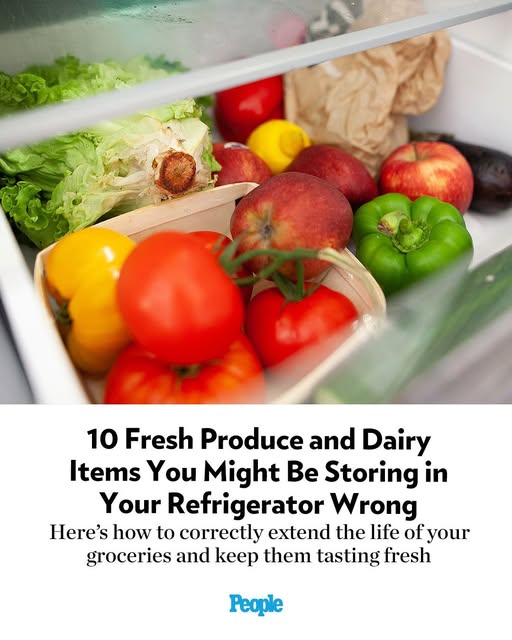Here are 10 commonly fruits and vegetables you might be storing in your refrigerator wrong-and tips on how to store them correctly.
1. Tomatoes
Wrong Storage: Refrigerating tomatoes dulls their flavor and turns them mealy.
Right Way: Keep them on the counter, out of direct sunlight, stem-side down. Only refrigerate once fully ripe if you need to preserve them for a day or two.

2. Onions
Wrong Storage: The fridge causes onions to become soft and moldy.
Right Way: Store whole onions in a cool, dry, well-ventilated place—away from potatoes, which emit moisture and gases that make onions spoil faster.
3. Potatoes
Wrong Storage: Cold temperatures convert potato starch into sugar, leading to a strange taste and texture.
Right Way: Store potatoes in a paper bag or box in a dark, dry pantry or cupboard.
4. Garlic
Wrong Storage: Refrigeration promotes sprouting and alters flavor.
Right Way: Keep garlic in a dry, ventilated container at room temperature. Avoid plastic bags, which trap moisture.
5. Avocados
Wrong Storage: Refrigerating underripe avocados slows the ripening process.
Right Way: Leave them on the counter until ripe. Once they’re soft, transfer them to the fridge to extend their life for a few more days.
6. Basil
Wrong Storage: The fridge turns basil black and limp.
Right Way: Treat basil like fresh flowers—trim the stems and place them in a glass of water on the countertop. Cover loosely with a plastic bag if needed.
7. Cucumbers
Wrong Storage: Cucumbers are sensitive to temperatures below 50°F (10°C), which can lead to watery, pitted flesh.
Right Way: Store cucumbers at room temperature and use within a few days. If you must refrigerate, keep them toward the front of the fridge.
8. Bell Peppers
Wrong Storage: Fridge humidity can make peppers wrinkle and lose their crunch.
Right Way: Store in a cool, dry spot for up to five days. For longer storage, place them in a paper bag in the refrigerator’s crisper drawer.
9. Apples
Wrong Storage: While they can last in the fridge, apples release ethylene gas that speeds up ripening in nearby fruits.
Right Way: Store apples separately, either at room temperature for a week or in the fridge crisper drawer away from other produce.
10. Bananas
Wrong Storage: Refrigeration halts ripening and causes the peel to darken prematurely.
Right Way: Keep bananas on the counter. If they ripen too fast, peel and freeze them for smoothies or baking.

Conclusion: Store Smart, Waste Less
Proper storage not only helps maintain flavor and nutrition but also reduces food waste. Understanding where each fruit or vegetable thrives best—whether at room temperature or in the fridge—can make your produce last longer and taste better. A few small changes in how you store fresh produce can make a big difference in your kitchen. Making these small adjustments to your food storage habits can also save you money by reducing how often you need to replace spoiled produce. Additionally, correctly stored fruits and vegetables contribute to healthier meals and less food waste, supporting both your well-being and the environment. Start storing smarter today!

















